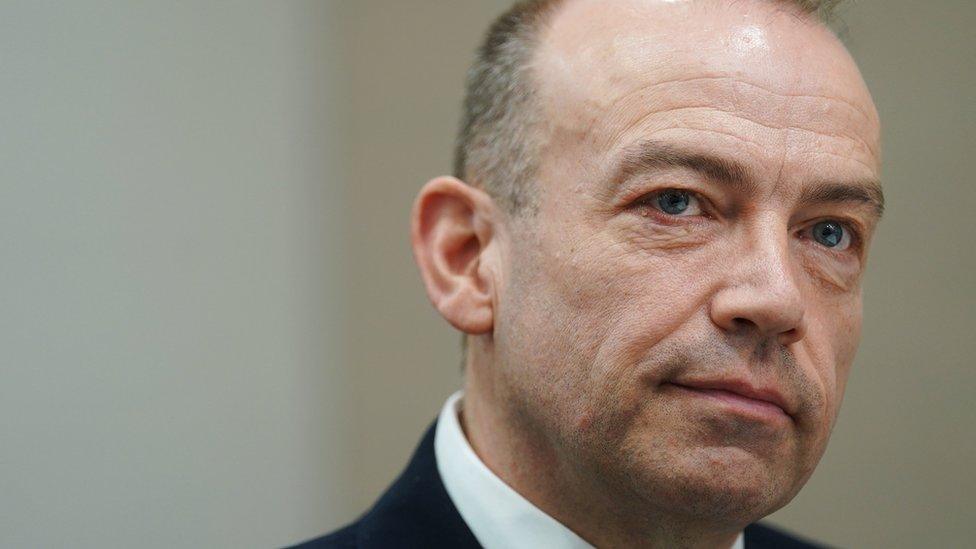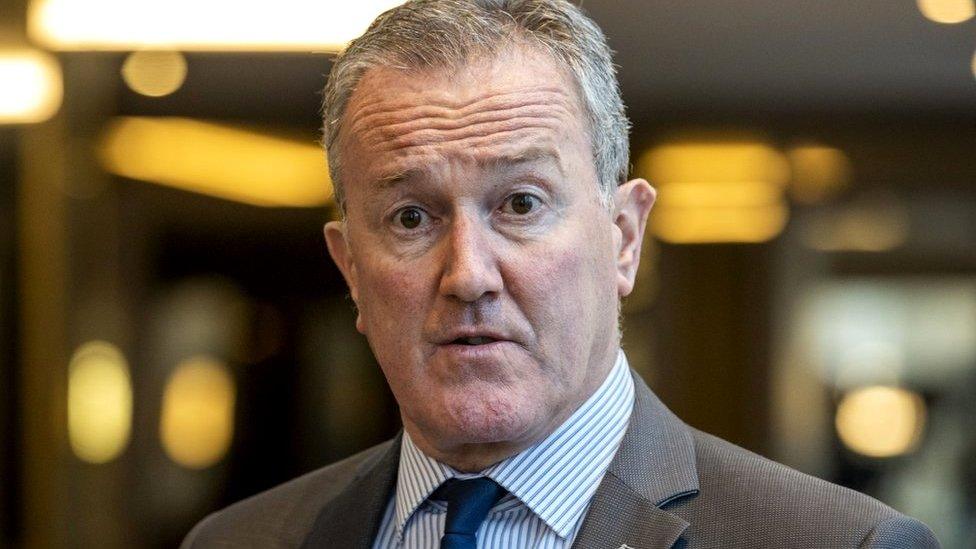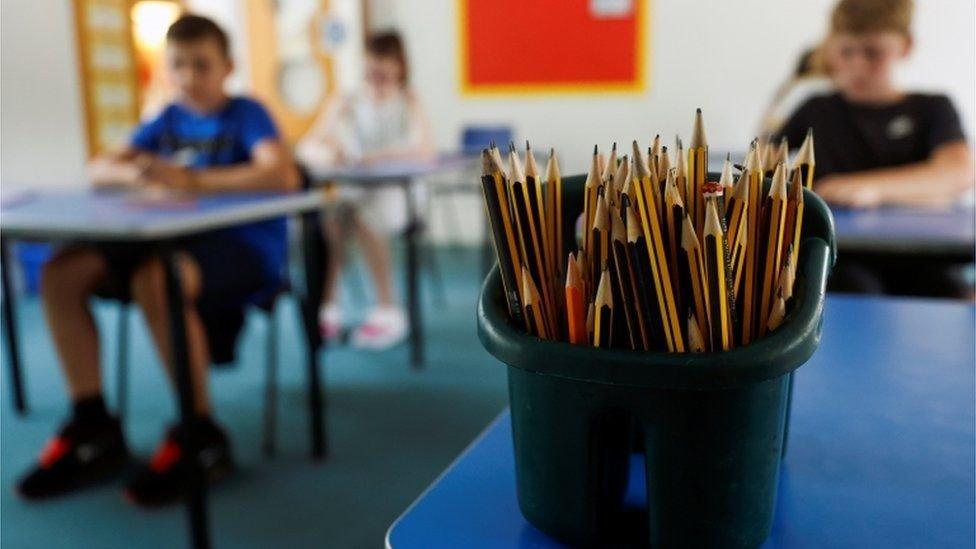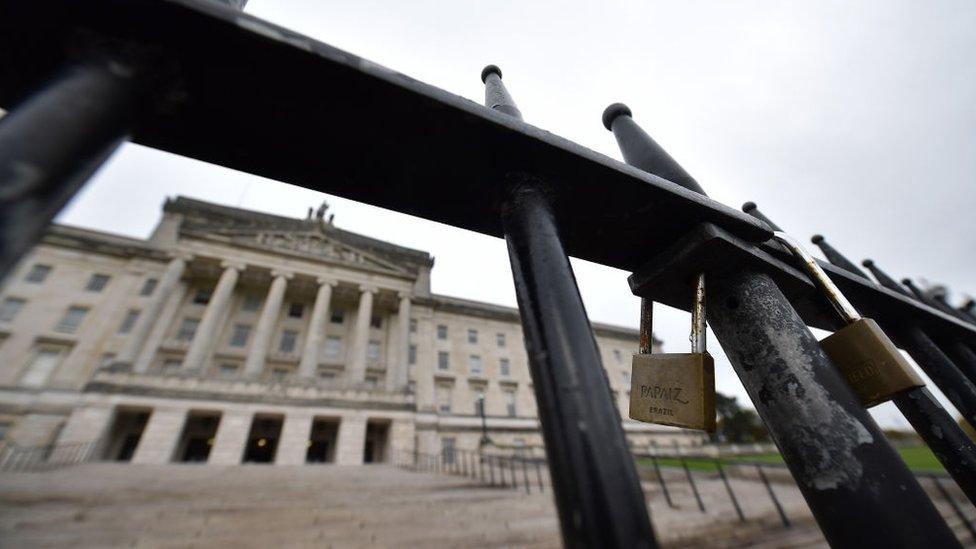Stormont departments face budget cuts of almost 10%
- Published
- comments

Chris Heaton-Harris is seeking more detail about his options for cuts to department budgets
Some Stormont departments are facing cuts of almost 10% when the budget for Northern Ireland is finally published.
Northern Ireland Secretary Chris Heaton-Harris has asked officials to clarify his options for cuts.
That exercise is expected to take about two weeks and the budget for this financial year is not likely to be finalised this month.
Mr Heaton-Harris will set the budget in the absence of ministers in a functioning Northern Ireland Executive.
He has also asked officials to look at the size of the public sector workforce and options for revenue raising, such as water charges.
However it would not be possible to implement those sorts of policies in this financial year.
It is understood that as well as bringing a Budget Bill to Parliament Mr Heaton-Harris will also need new legal powers to direct Stormont officials to make cuts.
Permanent secretaries have been running Northern Ireland departments since October due to the Democratic Unionist Party's (DUP) boycott of Stormont.
But with none of the nine department ministers in place the powers of civil servants are severely limited.
They can only implement policies previously agreed by politicians and their ability to react to changing circumstances is negligible.
This week a union representing senior civil servants said politicians, not civil servants, should make any "exceptionally difficult decisions" on Stormont's public finances.
Last month the Northern Ireland Fiscal Council, an independent budget watchdog, said departmental spending was due to fall by 6.4% in real terms in 2023-24.
However if the Department of Health, which is the biggest department, is protected it would mean deeper cuts in other areas.
'This will only get worse'
Politicians in Northern Ireland have voiced their concerns about the cuts.
On Thursday DUP MP Gavin Robinson called for a "serious look" at the Barnett formula, which is used to determine annual changes to the block grants for Northern Ireland, Scotland and Wales.
"The Treasury contribution to fund public services in Northern Ireland is going down rather than rising," he said.
"As an example, in England up to 2025, spending will increase by 6% but only 3.6% in Northern Ireland.
"The cost of providing public services for a small place is more expensive than a large one - we don't benefit from economies of scale or critical mass."
Mr Robinson said that unless there was a "total recalibration of how Northern Ireland is funded" the situation would "only get worse".
On Wednesday Sinn Féin's Conor Murphy described the forthcoming financial arrangement as a "punishment budget".
It was revealed in February that services provided by Northern Ireland Executive departments faced cuts of at least £500m in cash terms in the new financial year.
Inflation will increase the effects of those cuts.
Part of the reason for the falling budget was the need to bring forward about £330m to the 2022-2023 financial year to deal with an overspend.
Stormont spends about £14bn a year with the bulk of that going to health and education.
'Stripping meat off the skeleton'
Last week it emerged that the overall budget to fund schools in Northern Ireland had been cut for 2023-2024.
On Thursday the principals of two primary schools spoke about the effects of potential budget cuts.
Keith Wysner of Whiteabbey Primary School in County Antrim said there was "little more" his school could do tighten its spending.
"The meat has been stripped off our bones completely since about 2012-14 because of the budget structure and we have been operating with a very, very limited budget since then," he said.
"We talk about stripping the meat off the skeleton - well, you know what, we are taking away every other rib at the minute to be able to educate our current generation."
Sandra Isherwood of Jones Memorial Primary School in Enniskillen, County Fermanagh, said pupils would be "detrimentally affected" by the cuts that officials had in mind.
"The 10% cuts with the increase in fuel and all other factors - it [equates to] a teacher's salary, which in turn will roll out to increase class sizes," she said.
"But more importantly it is affecting the vulnerable children that are in our school."
Related topics
- Published5 April 2023

- Published31 March 2023

- Published28 March 2023
